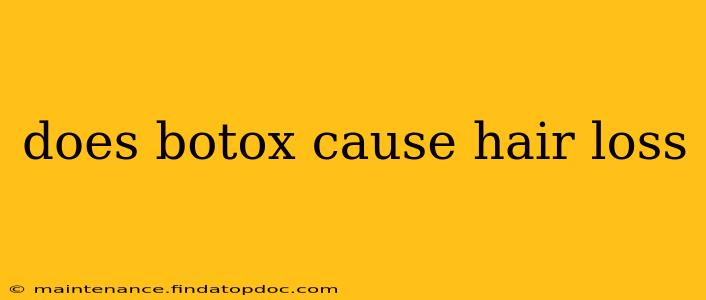The question of whether Botox causes hair loss is a common one, sparking concern among those considering this popular cosmetic treatment. While anecdotal evidence might suggest a link, the scientific consensus is more nuanced. This article will delve into the current understanding of Botox and its potential relationship with hair loss, addressing common questions and concerns.
What is Botox and How Does it Work?
Botox, short for botulinum toxin type A, is a neurotoxic protein produced by the bacterium Clostridium botulinum. In cosmetic applications, it's injected into specific muscles to temporarily paralyze them, reducing the appearance of wrinkles and fine lines. It works by blocking the release of acetylcholine, a neurotransmitter responsible for muscle contraction. This effect is localized and temporary, typically lasting several months.
Can Botox Directly Cause Hair Loss?
The short answer is: No, Botox itself does not directly cause hair loss. The injection sites are typically in the face, far removed from the hair follicles on the scalp. The mechanism of action—blocking acetylcholine—doesn't directly affect hair growth or the hair follicle cycle. There's no scientific evidence linking Botox injections to widespread hair loss.
Why Might Some People Experience Hair Loss After Botox?
While Botox doesn't directly cause hair loss, several indirect factors might contribute to perceived hair loss after treatment:
Stress and Anxiety:
Undergoing any cosmetic procedure, even a minor one like Botox, can cause stress and anxiety in some individuals. Stress is a known contributor to temporary hair shedding (telogen effluvium), a condition where hair enters the resting phase prematurely. This shedding typically occurs several weeks after the stressful event.
Underlying Medical Conditions:
Hair loss can be a symptom of various underlying medical conditions, some of which might be unrelated to the Botox treatment. If you experience hair loss after Botox, it's crucial to consult a doctor to rule out any underlying health issues.
Nutritional Deficiencies:
Nutritional deficiencies can also lead to hair loss. While Botox itself doesn't affect nutrition, any changes in diet or lifestyle following the procedure might indirectly contribute to hair shedding.
Could the Injection Technique Contribute to Hair Loss?
Theoretically, accidental injection into the scalp could damage hair follicles, leading to localized hair loss. However, this is extremely rare due to the careful injection techniques employed by qualified and experienced professionals. Choosing a board-certified dermatologist or plastic surgeon significantly reduces the risk of this complication.
How to Minimize the Risk of Hair Loss After Botox:
- Choose a qualified professional: Selecting a board-certified dermatologist or plastic surgeon minimizes the risk of complications, including accidental injection into the scalp.
- Manage stress: Implement stress-reduction techniques like exercise, meditation, or yoga.
- Maintain a healthy lifestyle: Ensure a balanced diet, sufficient sleep, and regular exercise to support overall hair health.
- Communicate with your doctor: Discuss any concerns or pre-existing medical conditions before the procedure.
What if I experience hair loss after Botox?
If you notice any unusual hair shedding after Botox, consult your doctor or dermatologist. They can assess your situation, rule out other underlying causes, and offer appropriate advice or treatment. Don't self-diagnose or self-treat.
In conclusion, while anecdotal reports may exist, credible scientific evidence does not support a direct causal link between Botox injections and hair loss. Concerns about hair loss after Botox are often linked to unrelated factors like stress or underlying medical conditions. Choosing a qualified injector and maintaining a healthy lifestyle minimizes potential risks. Always consult a healthcare professional for any concerns regarding hair loss.
